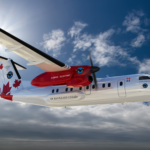A new digital aviation facility at Cranfield University has been officially opened by Business Secretary Kwasi Kwarteng.
The £67 million Digital Aviation Research and Technology Centre (DARTeC) is located next to Cranfield’s airport and consists of a central building with digital aviation research laboratories and collaborative open plan office space where staff, students and partners work together, and a partially covered ‘hangar laboratory’ connected to Cranfield’s 737-400 aircraft through an airport-style air bridge.
Researchers at DARTeC are already working with industry partners to advance the application of digital technologies in the air transport sector. Projects are underway to drive forward innovations in digital airspace and airport infrastructure which will help the UK reach its target of net zero carbon emissions and support industry to bounce back stronger from COVID-19.
Addressing research challenges within the aviation industry
- DARTeC aims to address some of the main research challenges facing the aviation industry, including:
the integration of drones into civilian airspace; - increasing the efficiency of airports through technological advances;
creating safe, secure shared airspace through secure data communication infrastructures;
increasing the reliability and availability of aircraft utilising self-sensing/aware and self-healing/repair technologies.
Professor Graham Braithwaite, Project Lead and Director of Transport Systems at Cranfield, said: “I’d like to thank everyone involved in realising our vision to create this state-of-the-art facility, including colleagues at Cranfield, our industry partners and Research England. DARTeC is already playing a pivotal role in helping to define and develop the aircraft, airports, airlines and airspace management systems of the future, illustrating what is possible through the power of partnership and collaboration.”
Facility will help give the UK “competitive advantage” in sustainable aviation
Kwasi Kwarteng, Secretary of State for Business, Energy and Industrial Strategy, said: “This exciting new facility hails the dawn of a new era in our plan to deploy new technologies to cut emissions from aviation, paving the way for the sector to move towards a more efficient, greener and safer future.
“Backed by government funding, Cranfield University is helping to strengthen the UK’s competitive advantage in the rapidly emerging market in sustainable aviation, helping us achieve our net zero ambitions and strengthening our economy for future generations.”
“National asset for ground-breaking research”
Professor Sir Peter Gregson, Chief Executive and Vice-Chancellor of Cranfield University, said: “The opening of DARTeC marks another stage in Cranfield’s proud history and heritage in aircraft and aviation research over the last 70 years. The Centre will provide a unique national asset for the ground-breaking research which will be key to overcoming the challenges of future flight and delivering sustainable growth for the aviation sector.”
The facility will include “game-changing technologies” such as the first operational digital air traffic control tower in the UK and next-generation radar technologies on the University’s licensed airport, which will create a unique research and development environment. The co-located National Beyond visual line of sight Experimentation Corridor (NBEC) provides a safe, managed environment for drone and unmanned aircraft experimentation.
DARTeC consortium partners include Aveillant, Blue Bear Systems Research, Boeing, BOXARR, Connected Places Catapult, Cranfield University, Etihad Airways, Heathrow, Inmarsat, the International Air Transport Association (IATA), the IVHM Centre, Saab, Satellite Applications Catapult, Spirent Communications and Thales, with co-investment support from Research England.
Ongoing research includes nine projects announced as winners of UK Research and Innovation’s Future Flight Challenge, with a total award value of over £8.5 million.
Main image: l-r, Professor Graham Braithwaite, Kwasi Kwarteng, Sir Peter Gregson

